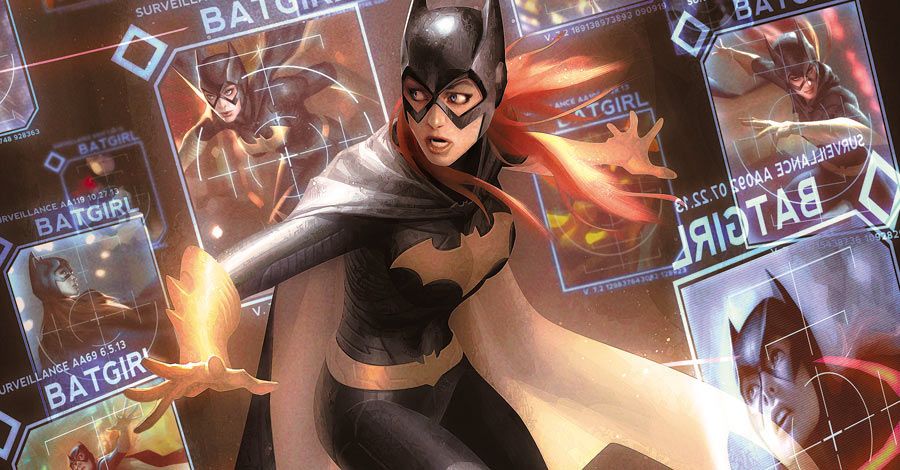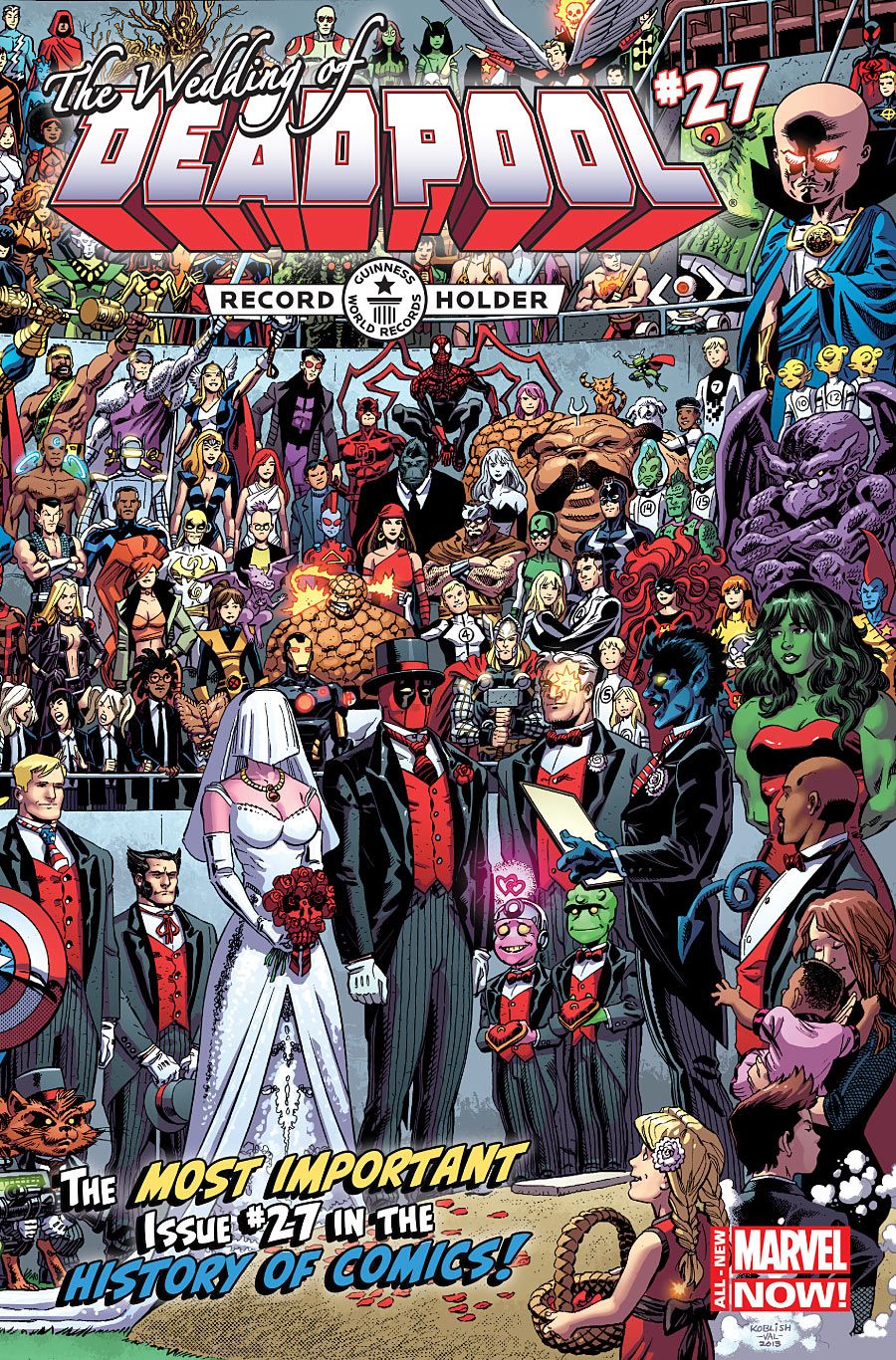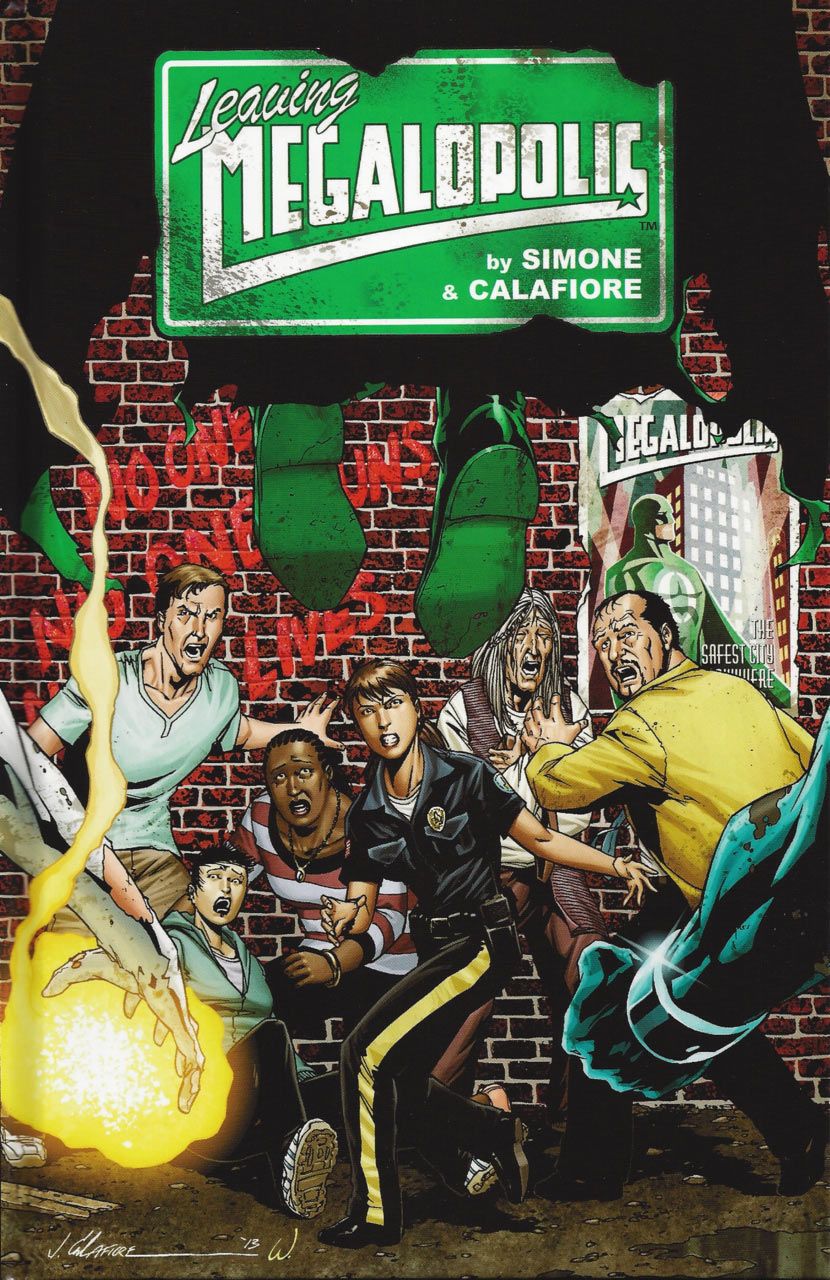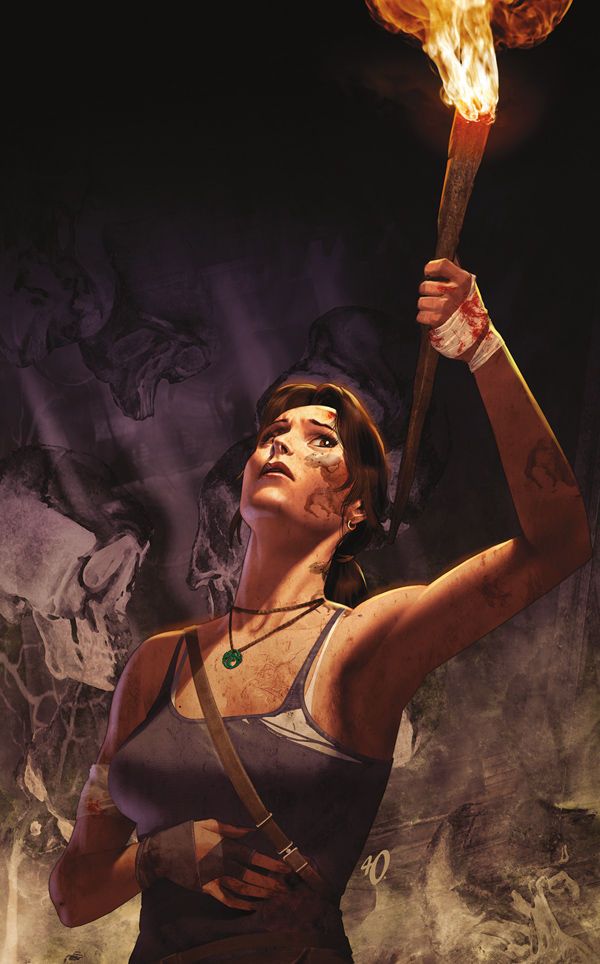Gail Simone's comics origin is no secret to devoted Comic Book Resources readers. As she and CBR's executive producer Jonah Weiland reminisced in the Secret Origins room at Emerald City Comicon, the site and the writer share a 17 years of history. "I literally would not have this career without Jonah. He put the column up in the beginning that started all the trouble," she said, referring to "You'll All Be Sorry!" a CBR mainstay from 1999 to 2003.
"I may have published it on an early version of CBR, and thanks for letting us do that," Weiland said, "but you were already writing crazy stuff and sending it around to different comic book creators, were you not?"
"I most certainly was!" Simone replied. "I live in a really small town, that has not had a comic book store ever, except for maybe two or three years of my entire life. I love comics and I have read them my entire life, but when message boards popped up that were comic related, that was the only way that I could talk to other people who read comics and ask questions of creators. So I was hanging out there, because there was really no one else to talk to. And then I started doing these little parodies, kind of for my own amusement, and they got circulated, and that was kind of how that started."
"That was back in the days that CBR didn't make any money. CBR made nothing at all, and she did them for free," Weiland admitted. "We were up some nights until 4 or 5 in the morning working on them. You were really dedicated to building this career back then --"
"I wasn't trying to build a career!" Simone cut in. "I was just really having a good time. I had my hair salon, which is what I did with my day. No one knew I was [writing the column], even in my family. My hubby didn't know about it. I would work in the salon during the day and do this at night, just for fun. I just said whatever I wanted to say, so it's kind of a miracle that I do have a career in this industry! I pretty much made fun of everything in the industry and a lot of other pop culture things. But it wasn't like I set out trying to have a career then. I had a career in my mind; my salon was my career. [Writing] was my fun."
Gail Simone Makes a "Savage" Return to Marvel With "Wolverine"
From there, the conversation jumped forward to the character Simone is probably best known for writing: Batgirl. "You've been writing this character in some form or another for I believe 11 years," Weiland said. "Talk about what this character means to you."
"When you're writing someone else's licensed characters, you know in your heart and in your brain that you don't own these characters," Simone said. "These characters belong to the company, and they can take whatever direction they want with them. However, whenever I'm writing any book, I have to have a certain amount of vision for it.
"With Barbara Gordon, one of the reasons that I was so honored was because she had a profound effect on me when I was growing up," Simone continued. "I was the only redhead at my school; I was kind of a little smart girl who was kind of weird. Watching the syndicated 'Batman' television series really affected me because [Batgirl] had the red hair and she could kick butt and she was really smart. I really identified with her and got involved in her character because it was something so different than what I had seen up to that point. As a young girl reading stories, any female character having adventures at that time, they were thrust upon them or happened by accident. Female characters did not go seeking their own adventures, and there is a huge difference between a character who falls down a rabbit hole or gets taken up to Oz outside of her own power, and a character like Batgirl or Wonder Woman who actively participate and make the decision to have these adventures. That clicked at an early age, and that's how my relationship with Barbara started."
Once the interview was opened to audience questions, Simone was asked if any of the backlash she feared from her early columns had ever come to fruition. "Here is the deal," Simone answered. "I started off pissed off, and I've kind of stayed pissed off about certain things all of this time. I get hate mail every single day. If you want to call that backlash, that's fine. I call it, 'I'm doing something that makes people uncomfortable and that they haven't seen before.' I wasn't really afraid of that. One editor, one time, made the joke that he felt like he had to hire me so that I would stop writing the column. It was a joke! They'd never really hire anybody for that reason, but it was getting around and people in the industry were very aware of it. And a lot of them were fans of it! Even though there were things that I made fun of, it was still written with a love of comics and a love of the industry, and that's something that comes through."
Weiland concurred. "Your edict always was, it has to look fun, it has to be fun, it's not mean-spirited. I think if you can laugh at yourself, you saw that."
"The truth is, people started coming up to me in the industry and saying, 'Why haven't you made fun of me?!'" Simone confessed, eliciting laughter from the audience.
Weiland admitted to having seen many poorly-run Kickstarter campaigns, but lauded Simone for the way that she and artist Jim Calafiore managed theirs for "Leaving Megalopolis," asking what she had learned about the business and about her fans by going through that process.
After their run on DC's "Secret Six" ended with the launch of the New 52, Simone said that she and Calafiore were regularly asked what their next project together would be. "We really wanted to do a project that we had control over," she said. She praised Calafiore as "a great artist and a tremendous businessman. He's had a lot of experience in this industry," and she credited him for figuring out the practical details of the book's publication. "I was more the mouthpiece for the project and the publicity," Simone admitted. "And the scripter," she added with a chuckle.
Simone stressed that the project came from "this team, working with no barriers between themselves and the audience. I think that's what people responded to. The pitch was that there's this town, Megalopolis, that is the safest town in the world and is protected by the most noble superheroes. Then, one day, something goes horribly wrong and humanity becomes their prey. Our story was focused down on this small group of survivors just trying to get the hell out the city and away from this massive thing that's gone wrong."
Talking about her experience with Kickstarter and the overwhelming amount of work that went along with it, Simone admitted, "You do start to see some of what the big publishers are going through and understand some of the decisions that get made. It's like running a small business, and you need to follow through. I think Kickstarter is very important because there are so many amazing projects that could never get made without it."
EXCLUSIVE: Simone and Calafiore Bring "Leaving Megalopolis" to Dark Horse
"I don't think I have any barriers," Simone said in response to another question regarding working within publisher constraints. "Anyone who is familiar with my work will see that there are a lot of barriers that we've just plowed right over. I don't think DC or any other company has ever set up a barrier and said, 'You can't do this,' but I also understand that in a mainstream comic book, there are certain things that we aren't going to discuss, or that are going to happen off panel, or the violence is going to be at a certain level."
A young woman in the audience asked Simone how she felt the space for woman in the industry had changed over the course of her career. "Okay, here's the deal," Simone answered. "One of the first conventions that I went to when I was on a 'Women in Comics' panel, there were like nine of us. Only two of us were in what I would call comics, and the audience was literally three or four people, one of which was my husband. And last year at San Diego Comic-Con, we had a Women in Comics panel that had several thousand people in it, and people in the halls angry because they couldn't get in."
Remarking that the audience of conventions was shifting from primarily male to about a 50-50 ratio, Simone said, "I am so excited about that, and I'm excited about the diverse audience that we're getting, because the more diverse audience we get, the more diverse creators we're gonna get. And the more diverse creators we get, the more diverse characters we are gonna get. And it's all fantastic! And I was telling DC in the beginning, when we were starting 'Birds of Prey,' I was telling [DC Comics co-publisher] Dan DiDio, 'I am going to prove to you that Black Canary has value for your company, on her own, as a strong character and not just as Green Arrow's girlfriend.' And Dan said, 'Yeah, whatever Gail.' And by the time I was done writing those characters, she went off and led the Justice League!"
Weiland noted that what Simone had said about the gender balance at cons isn't yet seen among creators in the industry. "Do you think that shift is going to happen naturally," he asked, "or do you think it needs to be pushed?"
"It's so much more diverse than it was," she responded. "I'm not saying that we're there yet -- we're not. But it's so much more than it was, throughout the companies.It's a lot more diverse. A lot of people who were afraid to come out are out now. It's opened up a lot from what it was. Are we there yet? Not by a longshot."
Addressing Simone's status as "one of the most prominent female creators in comics" directly, Weiland asked if it was a role she felt comfortable being in. "That's kind of a strange question," she remarked. "Coming in to my office every day to work and write, I don't think of myself as a woman in this industry. I want to tell a story hasn't been told before, and if I'm creating new characters, I definitely want them to be characters we haven't seen before, in lots of different ways. I like equality for everyone, in all ways. I don't think of myself as a mentor, I don't think of myself as someone who is preaching. I just think of myself as someone who is telling stories that haven't been heard before."
An audience member asked how Simone felt, generally speaking, about the treatment of female creators in the industry. "I have never been treated poorly by the industry," Simone answered. "That is my personal experience. But I know lots of female creators have had a different experience than that. I also know that publishers are looking for female creators because they are starting to see that they have something to offer. It's becoming something that they're looking at and are aware of."
Weiland turned the conversation back to some upcoming projects that Simone has in the works with Marvel. "It's really fun to be back at Marvel. I'm just doing a couple of short things for now. One of them is 'Deadpool' #27. 'Deadpool' was my first mainstream comics work. Hopefully you guys will pick it up. If you're fans of things that are really inappropriate that will be a good one for you. I've only written Wolverine one other time that I can think of, but Jubilee is in [my 'Savage Wolverine' story], so it's this really interesting relationship that's going on in it."
Asked if there are any other Marvel characters she'd love to get her hands on, Simone admitted to really wanting to work on Spider-Man. "Dan Slott will probably kill me, though," she joked, saying she would get a chance with the wall-crawler "when Dan Slott retires -- or I throw him in a dungeon somewhere," she added to uproarious laughter.
Simone's experience writing for TV was another topic of interest for the audience, with one attendee asking whether it was different writing for TV than for comics, wondering, "how the heck [Simone got] away with that song with the Birds of Prey?!" Simone admitted that, unfortunately, the song wasn't hers. "It sounds like something I would have written! But I didn't write it.
"With television, instead of having maybe two or three editors, you might have twenty," Simone continued. "There are a lot of other people involved with it, a lot of other people you have to make happy, but it's still all about telling a compelling story that someone wants to keep watching past the first couple minutes. And you can't have a lot of dialogue, you have to accomplish a lot with a small amount of dialogue. But it's still visual. There are so many similarities, many more similarities than differences."
"I'm so proud of what she's accomplished and so proud of the fact that she's a strong female creator with her own fanbase," Simone remarked when asked about collaborating with Kelly Sue DeConnick. "That's an amazing thing! I would love to work with Kelly Sue, but we are both extremely busy now. But we do talk a lot and we talk a lot about the industry, and I really loved the script that she turned in for 'Legends of Red Sonja.' It was really fantastic."
"It was a pretty neat experience," she shared about her experience working on the animated "Wonder Woman" film. "We had a female director on it, and she was really interested in making Wonder Woman as strong and powerful and violent as possible. It was really fun to be working with another woman who thought that was cool. But I wrote the first script that went in for the film, and didn't write the final script. I had a lot more humor in it and didn't have as much sexual politics. But I thought they did an amazing job and I was really proud to be a part of that."
Weiland noted that the "Wonder Woman" animated film was surprisingly brutal, even compared to the other animated films from DC Universe, an assessment with which Simone concurred. "I think of Wonder Woman as a warrior, as a soldier, and the person in the DCU who you would call if you needed to win a war. So I was okay with that take on her. Though maybe that one had a little too much violence for a five year-old. We might need another Wonder Woman for the five year-olds."
"I've been a huge fan of Lara Croft," Simone said, as the conversation shifted to her current gig writing Dark Horse's "Tomb Raider" series. "I always am so excited because young women and young boys both who grew up with Lara Croft and Xena and Buffy -- such stronger characters than what I grew up with -- you can see what a difference that has made in their attitudes. To them, watching something or to read something with a strong female lead is no big deal. It's common."
Though Simone had written Lara Croft in the past -- an animated short called "Pre-Teen Raider" -- when Dark Horse asked her to take on the comic, she initially passed. "There had been some bad press that sounded kind of sketchy and weird," she said, presumably referring to the controversy around what looked like a sexual assault scenario in the newest "Tomb Raider" game. "But then I bought the game. I really admired Rhianna Pratchett, who was the lead writer, because she and all the team on it have created a younger, more vulnerable character who is less interested in treasure and more interested in solving mysteries and answering questions of our world and the universe. And it was so emotional; I had never seen a video game that had impacted me that way. So I called Dark Horse back and said, 'Um, is "Tomb Raider" still available? I think I'm interested now.' We decided it's going to be set after she gets off the island of Yamatai, and it's going to be canon for Lara's story. It's just an amazing journey with that character. It's so guttural, it's just incredible. I like this new take on her a lot."
Asked if she would ever consider taking a big decision-making role in one of the Big Two companies, Simone said, "I see myself more as a project director. If something came up that was interesting, I would consider it. I really loved coordinating all the stuff with 'Legends of Red Sonja.' But trying to be an editor and worrying about the numbers and stuff like that? That is so far from what I'm even remotely good at. No one would hire me, or if they did it would be a one day job. My brain just works too differently."





